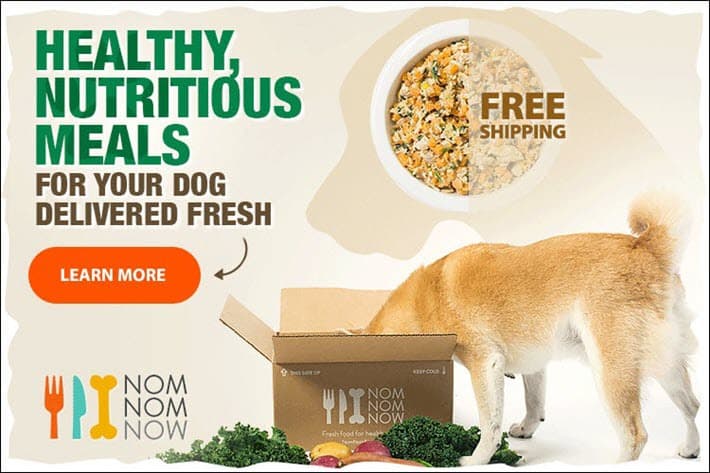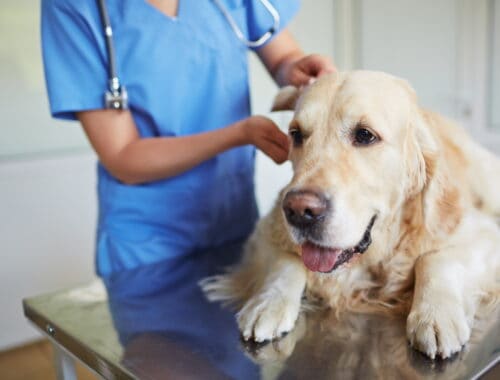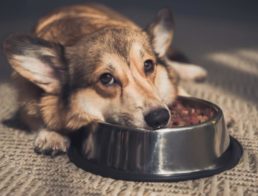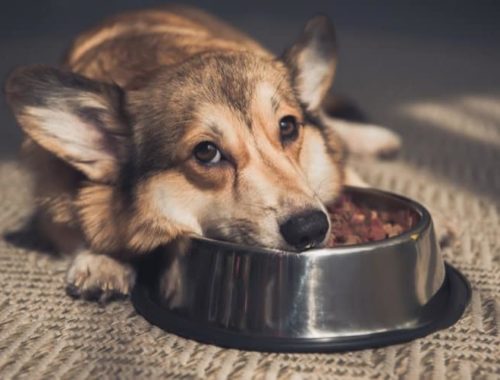While we all want to spoil our dogs with a little bit of human food at times, many foods that are perfectly safe for people may be harmful, and even deadly for dogs. Here are 10 foods to avoid giving your dog, even when he is begging relentlessly for a taste.
1) Chocolate
The toxic components in chocolate are stimulants called methylxanthines, specifically theobromine and caffeine. Within 6 – 12 hours of ingestion, chocolate may cause a dog to vomit, have diarrhea, and become agitated. Larger doses can result in tremors, an elevated heart rate, and seizures. Chocolate may also produce abnormal heart rhythms that can be life-threatening. Due to the high-fat content in some chocolate products, pancreatitis may also develop. If you know your dog’s weight, how much, and what type of chocolate he has eaten, you can use a chocolate toxicity calculator to check if your dog needs an urgent trip to the clinic, but if you have any questions at all, call your veterinarian.
2) Xylitol
Xylitol is a sugar alcohol used as a sweetener in sugar-free products. Dogs are especially sensitive to xylitol toxicosis and ingestion can lead to severe hypoglycemia (very low blood sugar levels), which can result in vomiting, weakness, confusion, seizures, and coma. Serious liver injury may also occur. If you suspect your dog has eaten a product containing xylitol, contact your veterinarian right away.
3) Grapes and Raisins
Eating grapes or raisins may cause no clinical signs in some dogs, but in others, ingesting just a few can lead to kidney failure and death. The specific toxin is still unknown. Initially, affected dogs may experience vomiting, diarrhea, weakness, increased thirst and urination, and trembling, but as the kidneys continue to fail, urine production may slow down and eventually stop. At this point, most dogs die or are euthanized. If your dog has eaten grapes or raisins, call your vet immediately.
4) Macadamia Nuts
The toxic agent has not yet been identified, but within 12 hours of ingesting macadamia nuts, dogs can develop vomiting, incoordination, weakness, fever, and depression. Most dogs recover within 48 hours without any specific treatment. Nevertheless, severely affected dogs may require supportive care and should be seen by a vet.
5) Garlic, Onions and Chives
These Allium species contain sulfoxides that are responsible for a number of clinical signs when eaten raw, cooked, or in powder form. Symptoms that may appear within a day or two of ingestion include vomiting, diarrhea, depression, pale or yellow mucous membranes, elevated heart rate, rapid breathing, weakness, discolored urine, and drooling. When ingested in high doses or over a long period of time, dogs may develop serious red blood cell damage and a potentially fatal anemia.

6) Raw Bread Dough
When ingested, uncooked bread dough that includes yeast expands in a dog’s stomach, which may lead to a potentially fatal condition called gastric dilatation and volvulus (GDV). Signs of GDV include a distended abdomen, drooling, pain, and repeated attempts at vomiting but little if anything is produced. Additionally, any alcohol produced during yeast fermentation is rapidly absorbed and can cause dogs to become weak and disoriented. Seizures and coma may follow. If your dog has any of these symptoms, call your veterinarian immediately for advice.
7) Avocado
Persin, the toxic component in avocado, is not particularly poisonous to dogs despite being highly dangerous to other animals, like birds. Large amounts could potentially cause gastrointestinal upset in dogs, but that’s about it. However, the large avocado pit can present a choking hazard or, if swallowed, obstruct the gastrointestinal tract.
8) Salty Snacks
While people find chips and other salty snacks tasty, too much salt can be dangerous to dogs. Of course, giving your pet a few pretzels is unlikely to cause any problems, but excessive salt intake paired with restricted access to water can lead to signs like vomiting, diarrhea, weakness, extreme thirst, tremors, seizures, and coma. Left untreated, salt toxicity can be fatal to dogs.
9) Fat Trimmings and Bones
Table scraps that contain bones or lots of fat are not as dog-friendly as they may seem. Fat trimmings, cooked or uncooked, may cause pancreatitis in dogs. Pancreatitis is a serious condition that typically results in abdominal pain, vomiting, and diarrhea and can be fatal in severe cases. Cooked bones can splinter when chewed and cause cuts or obstructions in your dog’s digestive tract.
10) Milk and Dairy Products
Similar to humans, dogs can have varying degrees of lactose intolerance. While some may be fine after occasionally indulging in a bit of ice cream, larger doses may lead to gas production, abdominal discomfort, vomiting, and diarrhea. Food allergies that result in itchy skin and chronic ear and skin infections may also be triggered in susceptible individuals.
Choose Healthy Treats Instead for Your Dog
It is important that snacks and treats should be limited to less than 10% of your dog’s daily calorie intake. This ensures that all your dog’s nutritional needs are met through their nutritionally complete and balanced dog food and helps prevent obesity.
Thankfully, pet parents can now choose from a large variety of healthy dog treats — peanut butter-based bites, dental chews, and grain-free and crunchy textured are a few good options. Or you may offer low calorie table veggies that many dogs love, like apple slices, baby carrots, and celery.
Speak to your vet about what treats may work best for your dog. He or she can advise you on your dog’s individual needs based on age, weight, and activity levels.
Featured Image Credit: Nattanan Zia, Shutterstock































